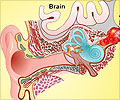About
Tinnitus is a ringing or a swishing noise that emanates from the ear or head. It is not considered a serious problem most of the time. The noise is usually heard only by the complaining individual and not by anyone else.
Tinnitus may not be a disease but can turn out to be a nuisance. Most of the time, tinnitus resolves on its own. It usually presents as a symptom of an underlying condition and very rarely may be due to a very serious health condition.
Causes
- The noise resulting from tinnitus may originate in the outer, middle or inner ear. It can also arise due to abnormalities in the brain. The noise is usually masked by outside noises and becomes evident when every other background noise is blocked out by ear wax or the presence of a foreign body in the ear.
Damage to the inner ear nerve endings is the most common cause of tinnitus.
- Wax blockage of the ear can give rise to tinnitus
- Fluid collection, infection, or other disease of the middle ear bones or the ear drum (tympanic membrane) can result in tinnitus.
- Rare conditions such as brain aneurysm or tumor can also cause tinnitus.
- Advancing age and exposure to loud noise (such as firearms, loud music) are common aggravating factors.
- Some medications such as aspirin can also cause tinnitus.
Diagnosis
Diagnosis of tinnitus is based on the following:
- Medical history – Symptoms like hearing loss, loss of balance (vertigo) or pulsatile tinnitus point out to the underlying cause of tinnitus
- Physical examination,
- Hearing test (audiogram) for patients with unexplained tinnitus
Special tests such as the auditory brain stem response (ABR), CT scan or an MRI scan may be done to rule out a tumor.
Treatment
Once the cause of tinnitus is identified, the doctor will be able to treat the problem.
Very often the condition resolves on its own and will go away with time. Alternatively, it may last all through a person’s life.
Some of the medications that are used to treat tinnitus include the following:
- Niacin - Niacin is used to treat the condition although no evidence exists to prove its benefit in the condition.
- Gabapentin - Gabapentin reduced annoyance levels although it could not control volumes of the noise. The drug is not considered to be better than a placebo.
- Acamprostate - Acamprosate, a drug used to treat alcoholism, was found to be fairly effective.
Managing Tinnitus
The following tips help in reducing or controlling the symptoms of tinnitus:
- Reduce / avoid coffee intake
- Avoid / reduce salt intake
- Avoid smoking
- If you suffer from zinc deficiency, take zinc supplements
- Those with sleep problem-related tinnitus may benefit from melatonin intake
- Some herbal medicine experts recommend Ginkgo Biloba as a natural remedy to control tinnitus. This has not been sufficiently proven
- Behavioral and cognitive therapies have proven to be effective in controlling tinnitus
Prevention
- Do not use objects such as cotton swabs while cleaning the ear as this can move the wax towards the eardrums
- Protect your ears while working. Make sure you use ear plugs or ear muffs to keep out the loud noise
- Avoid exposure to loud noise. Sometimes daily noise such as lawn mover, hair dryer or loud music may have to be shut out by ear plugs
- Take BP medicines as directed by the doctor
- Reduce intake of salt/caffeine
- Reduce stress
- The human ear and the hearing system comprises of delicate mechanisms which may be impaired when general health fails. Therefore it is important to safeguard one's general health.
- Avoid excessive use of aspirin and other drugs that cause tinnitus.
Frequently Asked Questions
1. Which doctors treat tinnitus?
ENT specialists treat tinnitus.
2. What is Pulsatile tinnitus?
Pulsatile tinnitus is the sound that accompanies the heart beat. It could occur due to a weak blood vessel called aneurysm near the ear or due to sudden increase in blood pressure.
3. What is Meniere’s disease?
Meniere’s disease is a condition where tinnitus is accompanied by dizziness and hearing loss.








